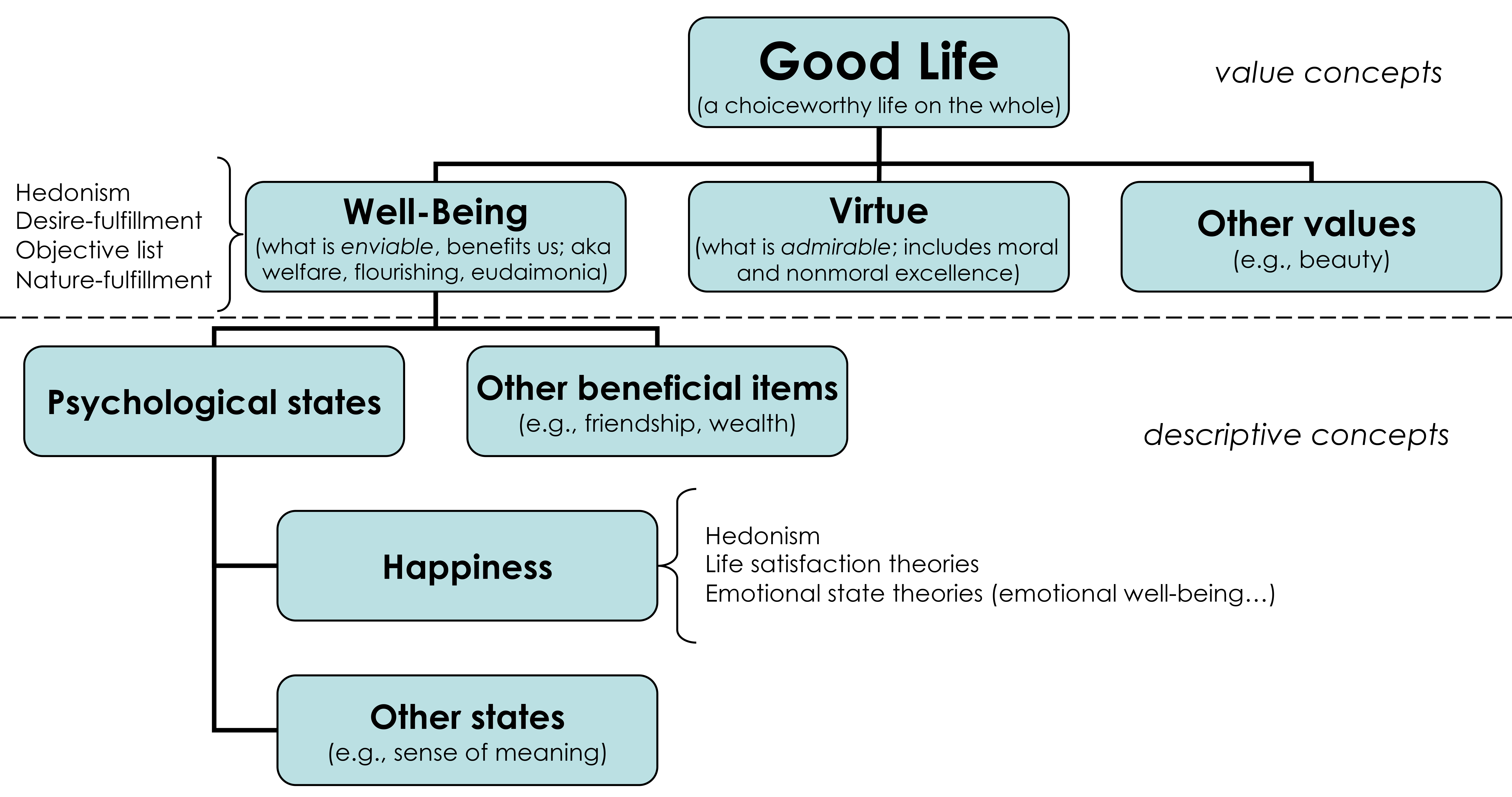Well-Being: Part 2
1 Well-Being
What is noninstrumentally good for a person
Well-Being
Theories of well-being attempt to tell us what makes a person’s life better or worse for them.
Synonyms and terms closely associated with well-being include:
- welfare
- personal-interest
- self-interest
- quality of life
- eudaimonia
- happiness
- flourishing
Theories of Well-being
We can divide theories of well-being into four major types:1
- hedonism
- desire satisfactionism
- eudaimonism
- objective list theories
Each theory offers a different account of final prudential value.
Objective Theories of Well-being
There are two major types of objective well-being theories:
- List Theories
- These theories begin with a list of intuitively plausible final goods. Lists vary from theory to theory but often include achievement, friendship, happiness, pleasure, and virtue.
- Eudaimonism
- Also called nature-fulfillment theory and perfectionism. It is finally good for a person to fulfill (or perfect) their nature. A person is doing well to the extent that they are functioning well, and poorly when they are not.
Attitude-independence
Objective theories are attitude-independent theories of well-being.
- Attitude-independence
- At least one thing that is basically good [i.e., is finally/non-instrumentally valuable] for subjects of welfare is not “pro-attitude-involving,” in the sense of necessarily being either the object of a satisfied positive attitude on the subject’s part or involving the subject’s having a satisfied positive attitude toward something. (Heathwood 2021, 16–17)
Sample Objective List
Guy Fletcher (brute list)
Achievement, friendship, happiness, pleasure, self-respect, virtue.
Mark Murphy (principled list: Natural Law)
Life, knowledge, aesthetic experience, excellence in work and play, excellence in agency, inner peace, friendship and community, religion, and happiness (meaning success in life plan)
Martha Nussbaum (principled list: human capabilities)
(1) Life, (2) Bodily Health, (3) Bodily Integrity, (4) Senses, Imagination, and Thought, (5) Emotions, (6) Practical Reason, (7) Affiliation (incl. social bases of self-respect), (8) Other Species, (9) Play, (10) Control over one’s Environment (political and material)
Eudaimonism
Sometimes called Perfectionism.
- Broadly Aristotelian
- Well-being = flourishing
- Generally,
- A person is doing well to the extent that they are functioning well or fulfilling their nature
- A person is doing poorly to the extent that they are functioning poorly or failing to fulfill their nature.
Wireless Philosophy Video: Aristotle on the Purpose of Life
https://www.wi-phi.com/videos/aristotle-on-the-purpose-of-life/
Issues for Objectivism
For Brute List
- These theories fail to give us unified theory of well-being.
- People have different intuitions about what to include on the list.
For Principled List/Eudiamonism
- Do we all flourish in the same way? What about people with disabilities or atypical individuals?
- Can eudaimonism account for the value of pleasure and the disvalue of pain?
2 Hybrid Theories of Well-being
Hybrid Theories of Well-being
Loving the Good (Adams 1999; Kagan 2009)
A person is doing well when they enjoy objects of objective merit or worthDesire-Perfectionism (Lauinger 2014, 2021) A person is doing when they both (a) exercise/develop their human capacities (eudaimonism) and (b) desire to do so (desire-satisfaction)
Eudaimonic-Hedonic Hybrids (Haybron 2008)
Haybron’s version: a person is doing well when they have (a) self-fulfillment and (b) pleasure.
3 Well-being as One Part of a Good Life

References
Footnotes
This taxonomy is based on Appendix I of Derek Parfit’s Reasons and Persons ([1984] 1987). Parfit did not include eudaimonism.↩︎